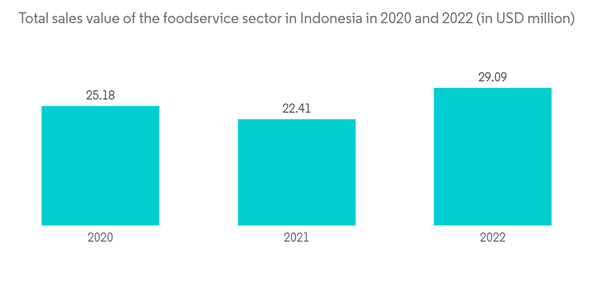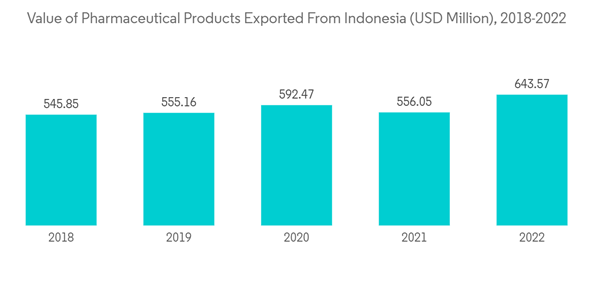Over the medium term, growing expansion of the distribution of stored food products from traditional markets toward supermarkets and convenience stores. Perishable goods such as refrigerated and frozen products are easier to procure, as major distributors offer shipping via insulated trucks, which in turn is likely to enhance the demand for refrigerated trailers in the coming years.
Demand for cold storage facilities could be estimated from the consumption of meat, fruits, vegetables, frozen potatoes, fish, shrimp, etc. The main export items in the Indonesian cold chain logistics market are perishable products like frozen food, seafood, and meat. Pharma is another industry that has been instrumental in growing cold chain logistics in Indonesia, which in turn is likely to enhance the demand for refrigerated trailers in the coming years.
The rising demand for refrigerated trailers is owing to an increase in demand for cold chain logistics in Indonesia as a result of the country's expanding e-commerce sector and growing adoption of digital technology. The country's rising number of refrigerated warehouses will fuel market expansion.
With the increase in transportation of the processed food industry due to rising food and beverage and meat product consumption across the country, it is anticipated to witness major growth for the market in the coming years.
Indonesia Refrigerated Trailer Market Trends
Rise in Transportation of Frozen Food Across the Country
The rising demand for processed food in the country, owing to an increase in the purchasing power of the consumer, is likely to witness major growth in the market in the coming years. In the processed food category, frozen food is anticipated to satisfy Indonesian consumers' desire for fast, easy food without sacrificing health advantages. While frozen food products shorten the cooking process, they nevertheless retain the majority of the nutrients found in fresh veggies or non-vegetable goods.The demand for frozen food is likely to be driven by hypermarkets and supermarkets with well-equipped storage and freezing facilities. In Indonesia, there is a rising demand for meat, prepared meals, and seafood and fish. With the increase in transportation of such goods across the country, the demand for refrigerated trailers is likely to grow in the coming year.
The rapid expansion of cold chain logistics across the country is anticipated to enhance the demand for refrigerated trailers. The Cold chain industries that depend on meat, fisheries, and processed foods have a sizable potential market in the country. The cold chain industry supports not only the fishing and food processing sectors but also the pharmaceutical and retail networks.
Several cold storage facilities have been busy handling the storage of fish/shrimps for exports and the local market. Seafood contributed 45% to frozen food consumption, followed by chicken with a share of 22% and meat with a share of 8%. The government set an ambitious goal of being the world’s largest shrimp producer and raising the nation’s shrimp export earnings by 250% by 2024.
With the above-mentioned-development across the county, the demand for refrigerated trailers is likely to grow during the forecast period.
Pharmaceutical Sector and Cold Chain Logistics Enhancing Demand
The increase in the number of refrigerated warehouses brought on by the country's rising perishables demand is likely to enhance the demand for refrigerated trailers in the coming years. The processed food sector is growing quickly as a result of rising demand for frozen fast food items as well as rising consumption of meat and other food and beverage items. Cold storage facilities in Indonesia are leveraging technological advancements to switch to renewable energy sources.Refrigerated Trailers are essential in the healthcare sector for the storage and transportation of temperature-sensitive medical supplies and equipment, such as vaccines, blood, organs, and medicines.
The government has been ramping up its efforts to promote and expand its healthcare sector, including the distribution and delivery of medical products. With the recent COVID-19 pandemic, there was a surge in demand for refrigerated transport for the COVID-19 vaccine, as well as other medical products that require a specific temperature range to maintain their potency and quality.
The pharmaceutical logistics industry in the country has been growing rapidly in recent years. This growth can be attributed to several factors, including the country’s strategic locations as a regional hub for logistics and transportation, a strong healthcare sector, and a favorable regulatory environment.
The government has invested heavily in the healthcare sector, with a focus on improving the quality of care and expanding access to medical services. This has led to an increase in the number of hospitals, clinics, and pharmacies, which has further driven the growth of the pharmaceutical logistics industry, which in turn is likely to create a lucrative opportunity for the market in the coming year.
The demand for pharmaceutical products continues to increase in the country; the industry is expected to continue to expand, creating new opportunities for logistics companies, pharmaceutical manufacturers, and other stakeholders in the sector, which in turn is likely to witness major growth for the market during the forecast period.
Such development in the healthcare and pharmaceutical sectors will create a demand for safe and efficient transport of healthcare products, thus propelling the demand for refrigerated trailers in the country.
Indonesia Refrigerated Trailer Industry Overview
Indonesia's refrigerated trailer market is dominated by several key players, such as Wabash National Corporation, Trane Technologies, Great Dane LLC, and Others. Rapid expansion of the logistics sector across the country is likely to witness major growth for the market in the coming years. For instance,In May 2023, PT Adi Sarana Armada Tbk (ASSA), one of the largest transportation service companies in Indonesia, and Triputra Group, a significant agricultural conglomerate in Indonesia, participated in the USD 3.8 million (RM17 million) seed round that Coldspace, an Indonesian provider of integrated cold chain solutions, completed.
In June 2022, Fresh Factory, an integrated cold chain firm in Indonesia, received USD 4.5 million in initial investment from East Ventures. PT. Saratoga Investama Sedaya TBK, Trihill Capital, Indogen Capital, Prasetia Dwidharma, Number Capital, Y Combinator, and angel investors were also participants in the round, according to a release from Fresh Factory.
Additional Benefits:
- The market estimate (ME) sheet in Excel format
- 3 months of analyst support
This product will be delivered within 2 business days.










